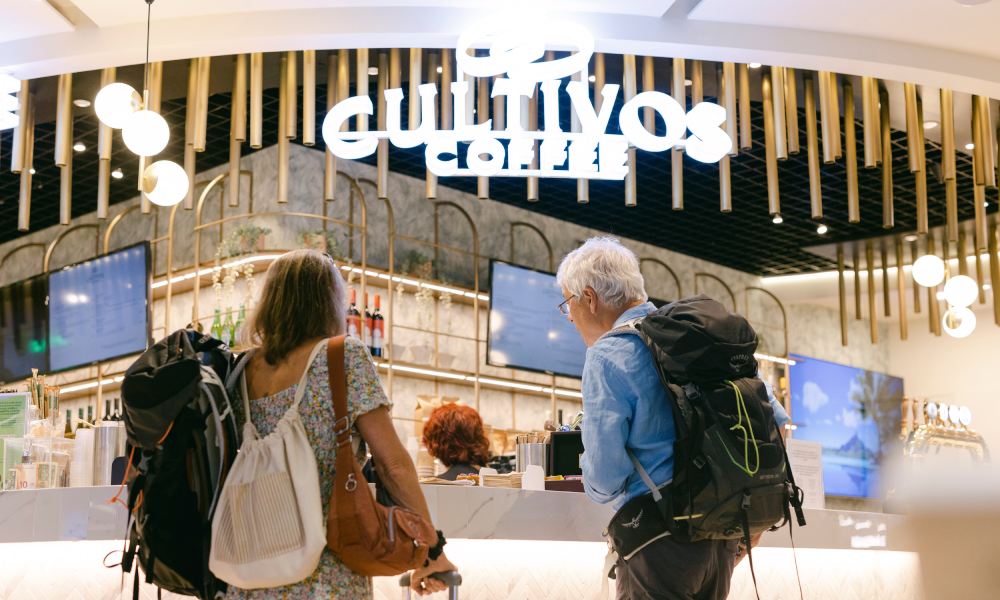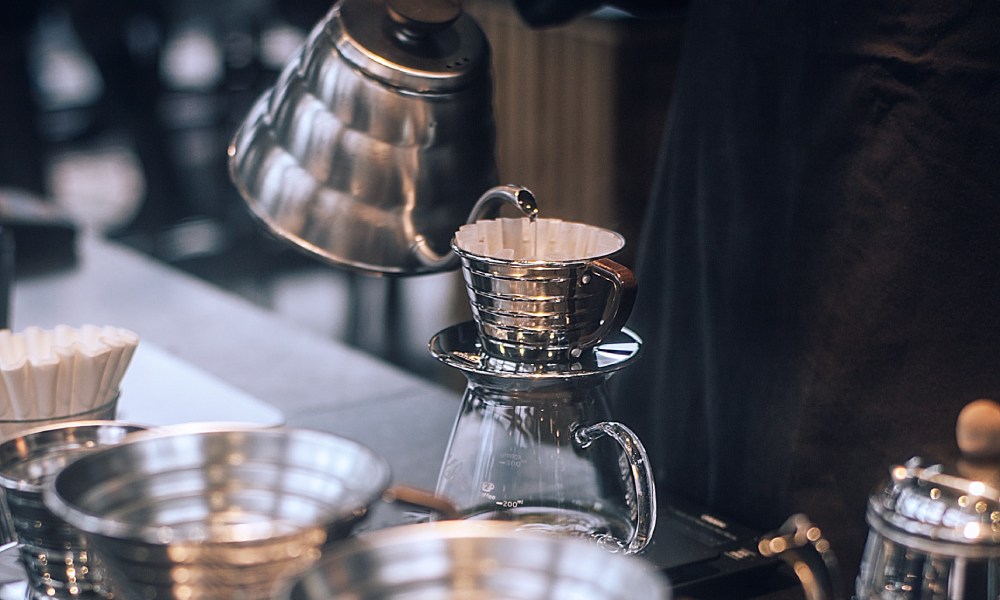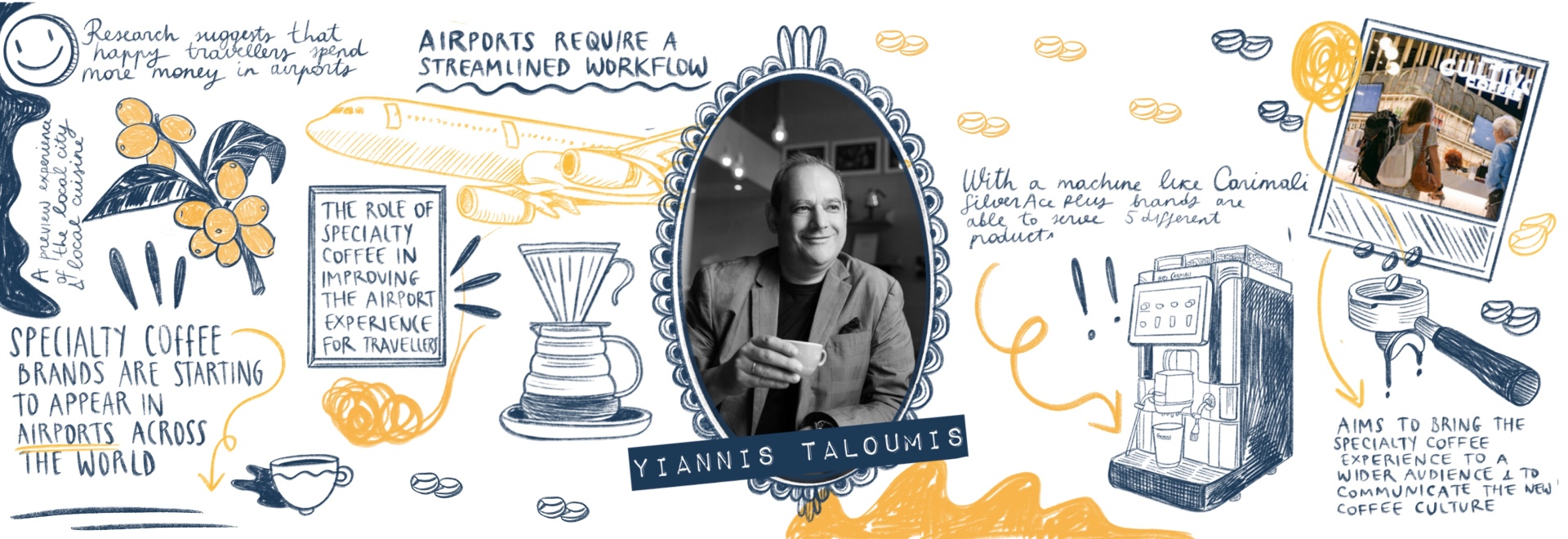Have airports finally accepted specialty coffee?
Specialty coffee brands are starting to appear in airports across the world. Lauren Loudon speaks with Yiannis Taloumis about how brands can maximise their presence in this new space.
As air travel fast returns to pre-pandemic levels, food and beverage operators in airports increasingly appear to have retained one crucial lesson from the lockdowns: support your locals.
With limited choices and an inability to leave the area to explore other options, airports provide coffee companies with a captive market – customers either buy coffee from what’s available, or they don’t buy coffee at all.
Long-term exclusivity deals have allowed multinational coffee chains almost unlimited access to airports, and the revenue opportunities they provide. While this gave these companies unrivalled access to travellers, it may have contributed to the general negativity directed towards airport coffee in previous years.
Until 2020, Starbucks held an agreement with HMSHost, a major food and beverage operator for airports in America, that allowed the company an overwhelming presence in US airports. Since the deal began in 1991, 400 Starbucks locations have opened in airports across the country, giving the company valuable visibility.
However, since the deal ended, the US airport coffee market has seen a variety of independent outlets enter the space previously held by major chains. For example, a new terminal at the New Orleans International Airport has seen locally owned PJ’s Coffee and Cafe du Monde set up shop.
Elsewhere, Taf Coffee partnered with Select Service Partner to open Cultivos Coffee inside Athens International Airport in May 2022.
Cultivos Coffee aims to bring the specialty coffee experience to a wider audience and to “communicate the new coffee culture and spread knowledge about superior quality coffee,” says Yiannis Taloumis, CEO of Taf Coffee.
This demonstrates a desire from independent businesses to use airports as a space to market their brand, as well as a willingness from food and beverage operators to expand the variety of coffee options available to travellers.

The role of specialty coffee in airports
Research suggests that happy travellers spend more money in airports. Increasing the number of independent outlets not only provides travellers with more eating and drinking options but may also increase their average spend.
In the 2019 study, happier travellers were more likely to spend upwards of $200 at the airport, while dissatisfied travellers were the least likely to spend. And traveller happiness is on the rise. 63% of global travellers stated that they enjoyed the airport experience, a 13% increase from the previous year.
As more people become familiar with a higher-quality cup of coffee, operators have noticed the role of specialty coffee in improving the airport experience for travellers.
Plus, exploring options beyond the homogenous selection of restaurant chains can also allow airports to provide a preview experience of the local city and local cuisine.
“Our coffee menu represents the local wave of specialty coffee in Athens,” Yiannis says. “Plus, our menu options offer flavours that harmonise with the local cuisine, such as cheese and spinach pies, and seasonal salads.”
Rather than global brands, airports are looking for local businesses to act as representatives of their city and culture.

Airports require a streamlined workflow
Airports offer independent businesses access to a wider range of customers that may otherwise not visit their stores. But these customers have a different set of needs.
“The store offers a seating area where customers can sit and take as much time as they wish to enjoy a beverage, while also offering a take-out service where people can pick up products on the go,” Yianis says. “Therefore, time at Cultivos has two dimensions and it is up to the customer to choose how they enjoy their experience.”
While large coffee chains have had years of experience honing their workflow for the airport market, independent businesses must adapt fast if they want to cater to travellers who may not be there for the specialty coffee experience, but to quickly grab and go.
At the same time, specialty coffee brands often have a strong set of values that they want to communicate. This could be about the increased quality of their product, more ethical sourcing practices, or a sense of company culture.
For specialty coffee brands operating in airports, success may be found by finding the balance between a streamlined workflow that serves customers quickly and efficiently, while still being able to express individuality and a clear set of values.
This is something Yianis is clearly aware of: “We have made sure that the value of the brand is not reduced by the speed of our customer service.”
To make striking this balance more difficult, finding trained baristas to work in airport terminals can be a challenge for specialty coffee brands. Airports can be difficult to get to, and this only amplifies a problem that already exists across the industry.
As such, we’re seeing more and more superautomatic coffee machines in airports to respond to staff shortages. They are more appropriate in an airport location with reduced operational space, and their focus on convenience and efficiency is suited to an on-the-go customer base.
With a machine like Carimali SilverAce Plus, brands are able to serve five different products, including two different coffees at any one time, and a new milk frothing system means that high-quality beverages can be served at the touch of a button.
Ultimately, specialty coffee brands now have access to a market which has previously been out of bounds for many years. To succeed in this new space, companies must streamline workflow to meet the demands of travellers, without losing a sense of what makes their brand unique.







